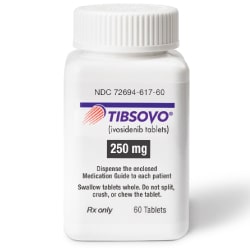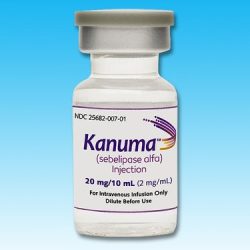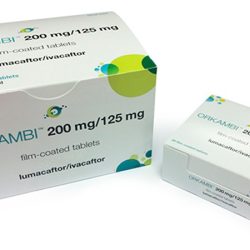Description
Tibsovo (ivosidenib) 250mg tablet is an IDH1 (isocitrate dehydrogenase-1) inhibitor used for individuals with a susceptible mutation IDH1 with:
-
- Newly Diagnosed Acute Myeloid Leukemia (AML): In conjunction with medicine azacitidine or as monotherapy to treat newly diagnosed AML in adults aged 75 years or older, or who have comorbidities that preclude the use of intensive induction chemotherapy.
- Relapsed or refractory AML: To treat adult patients with relapsed or refractory Acute Myeloid Leukemia.
- Locally Advanced or Metastatic Cholangiocarcinoma: To treat adults with locally advanced or metastatic cholangiocarcinoma who have taken prior treatment.
Dosage:
Newly Diagnosed Acute Myeloid Leukemia (Combination Regimen): The recommended dosage of Tibsovo tablets is 500 mg (2 tablets) taken orally once daily until disease progression or unacceptable toxicity. Start Tibsovo treatment on Cycle 1 Day 1st in conjunction with medicine azacitidine 75 mg/m2 intravenously or subcutaneously once daily on Days 1st to 7th (or Days 1st to 5th and 8th to 9th) of each 28-day cycle. For those without disease progression or unacceptable toxicity, continue treatment, in conjunction with azacitidine, for a minimum of six months.
Newly Diagnosed Acute Myeloid Leukemia and Relapsed or Refractory Acute Myeloid Leukemia (Monotherapy Regimen): The recommended dose is 500 mg taken orally once daily until the disease is progressive or unacceptable toxicity occurs. For those without disease progression or unacceptable toxicity, continue treatment for a minimum of six months.
Cholangiocarcinoma: The recommended dosage of Tibsovo tablets for locally advanced or metastatic cholangiocarcinoma is 500 mg taken orally once daily until the disease is progressive or unacceptable toxicity occurs.
Administer Tibsovo 250 mg tablets with or without food orally at about the same time each day. Do not administer this medicine with a high-fat meal because of an increase in the concentration of ivosidenib. Splitting, crushing, or chewing Tibsovo tablets is not recommended.
If any dose is vomited, a replacement dose should be administered; wait until the next scheduled dose is due. If any dose is skipped/missed or not taken at a fixed time, take the dose of Tibsovo tablets as quickly as possible and a minimum of 12 hours before the very next scheduled dose. Catch the normal schedule the very next day. Avoid administering a couple of doses within 12 hours.
Treatment Reactions: The most common side effects of Tibsovo when used in conjunction with the drug azacitidine or alone in adult patients with AML include: diarrhea, changes in blood cell counts, swelling of arms or legs, fatigue, increased blood sugar, changes in liver function tests, reduced electrolytes in the blood, nausea, vomiting, decreased appetite, and joint pain.
The most common side effects of Tibsovo in adults with Cholangiocarcinoma include diarrhea, fatigue, nausea, decreased appetite, abdominal pain, and cough.
Warnings and Precautions:
- In the study patients with newly diagnosed Acute Myeloid Leukemia treated with Ivosidenib tablets plus azacitidine experienced differentiation syndrome. In case this syndrome is suspected, start dexamethasone 10 mg intravenously every 12 hours (or an equivalent dose of a substitute oral or intravenous corticosteroid) and hemodynamic assessment until improvement.
- Those treated with Ivosidenib can develop QT (QTc) prolongation. Concomitant use of Ivosidenib with medicines known to prolong the QTc interval (e.g., antiarrhythmic drugs, fluoroquinolones, 5-HT3 receptor antagonists, triazole antifungals) and CYP3A4 inhibitors may scale up the risk of QTc interval prolongation. Monitoring of electrolytes and electrocardiograms (ECGs) should be conducted.
- Evaluate blood counts as well as blood chemistries before initiating Tisovo, at least once weekly for the 1st month, once every other week for the 2nd month, and once a month for the time span of therapy. Blood creatine phosphokinase should be monitored weekly for the first month of treatment.
- Guillain-Barré (GB) syndrome may develop in those treated with Tibsovo Ivosidenib. Monitor patients for the onset of new manifestations of motor or sensory neuropathy such as unilateral or bilateral weakness, paresthesias, sensory alterations, or breathing complications. Permanently discontinue treatment in those who are diagnosed with GuillainBarré (GB) syndrome.




